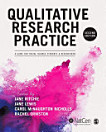Participatory Visual Methodologies: Social Change, Community and Policy
About this ebook
Organised around a series of tools that have been used across health, education, environmental, and sociological research, Participatory Visual Methodologies illustrates how to maintain participant engagement in decision-making, navigate critical issues around ethics, track policies, and maximize the potential of longitudinal studies. Tools discussed include:
- Pedagogical screenings
- Digital dialogue devices
- Upcycling and ‘speaking back’ interventions
- Participant-led policy briefs
An authoritative and accessible guide to how participatory visual methods and arts-based methods can influence social change, this book will help any postgraduate researcher looking to contribute to policy dialogue.
About the author
Claudia Mitchell is a James McGill Professor in the Faculty of Education, McGill University where she is the Director of the McGill Institute for Human Development and Well-being and the founder and Director of the Participatory Cultures Lab. She is an Honorary Professor in the School of Education, University of KwaZulu-Natal, South Africa. She was the 2016 recipient of the Social Sciences and Humanities Research Council Gold Medal awarded for the impact of her research which cuts across a number of areas including girlhood studies, youth, sexuality, and HIV and AIDS, gender violence, and teacher identity, and in a number of countries including Canada, South Africa, Russia, Ethiopia, and Kenya. As a methodologist she is particularly interested in participatory visual research, memory work and material culture, and autoethnography.
Naydene de Lange is Emeritus Professor in the Faculty of Education at the Nelson Mandela Metropolitan University, Port Elizabeth, South Africa. She previously held the HIV and AIDS Education Research Chair in the Faculty of Education at the same university. Her research focuses on using participatory visual methodologies in addressing gender and HIV&AIDS issues, and integrating HIV&AIDS into Higher Education curricula.
Relebohile Moletsane is Professor and the John Langalibalele Dube Chair in Rural Education in the School of Education, University of KwaZulu-Natal in Durban, South Africa. Her areas of research include curriculum studies, rural education, gender and education, sexual and reproductive health education, girlhood studies and girls education in Southern African contexts. She is the Co-PI (with Claudia Mitchell, McGill University) on the Networks for Change and Wellbeing project (Networks for Change and Well-being (www.networks4change.co.za/). The project uses participatory visual methodologies, including photo-voice, participatory video (cellphilm), digital storytelling and drawing to address sexual violence with girls in rural KwaZulu-Natal.






